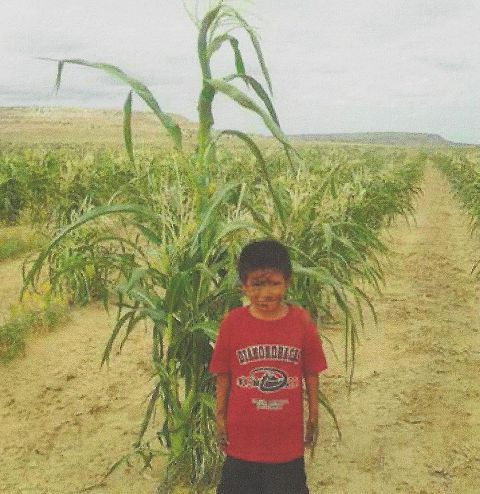 |
Canku Ota
|
 |
|
(Many Paths)
|
||
|
An Online Newsletter
Celebrating Native America
|
||
|
April 2015 - Volume
13 Number 4
|
||
|
|
||
|
Traditional Hopi
Foods Help Combat Diabetes
|
||
|
by Valerie Nuvayestewa
- Diabetes Prevention Educator
|
||
I recently attended the 17th Native Diabetes Prevention Conference in Phoenix. The theme was "Protecting the Generations, A Lifespan Approach to Preventing Diabetes"; protecting our future by introducing "lifestyle changes" to our people so that they will never have to experience diseases such as diabetes. Lifestyle change is the modifying or eliminating long-held habits of eating or physical activity, and maintaining a new, improved habit over months and years; making the change permanent. I attended a session led by Dorothy Krupknick, MS. RD, CSO, "Individualized Nutrition Programs for Diabetes". She told us the path to better health is "you are what you eat". Trends are changing the way we eat, and we need to educate with accurate information. She then motioned towards my direction and said, "Going back to native plant-based diets, low-fat, high fiber foods is what you should be telling people. Using your ancient foods of corn, beans and squash, minimizing sugar intake to six teaspoons a day, using portion control and proper selection of food, is the way to go. But you, (I'm guessing she meant us native people), already knew that". So I found myself sitting up a little straighter, with a prideful smile, and then realizing in the same instant that yes, we do know this, but do little if nothing at all with our knowledge. That is why there is a 110% increase in diagnosed diabetes from 1990 to 2009 in American Indians and Alaska Native youth aged 15-19 years. We have substituted our traditional foods with marketed foods. While most Hopi/Tewa families use some traditional foods on ceremonial or festive occasions, a study of contemporary dietary practices identified a limited number of traditional food items in fewer than 25% of daily food records of Hopi/Tewa families. Older Hopi recognize our traditional foods as "giving good health, with a happy heart" and are dismayed that the young people no longer learn to produce and prepare them. "Traditional food is a big part of health, because Hopi food has a pleasing taste, and it's much healthier than what we eat today. It serves as a way for paying back people that do good deeds for you. It links us to our family and villages in certain times when we have weddings; it links us together through weddings, harvest, dances; it teaches us and identifies what roles we have as a female. It also is a big part of passages of our life, through puberty and the way we teach our kids. It brings us together for baby namings and ceremonies." (Respondent from Village of Oraibi, 2006) My father told me that we need to remember and recall what prayers were made for us when we are born; "Be happy and have a long healthy life without illness and go to sleep in old age. At birth, the first food eaten by the infant is Hopi food. The statement is, "Here, have this food; this is your food", as the infant is fed Hopi food. This signifies that we have our own Hopi food for our bodies, which, for centuries, have provided nourishment. Now we are eating other foods that are not good for our bodies. Too much sugar, preservatives in food, energy drinks, potato chips, etc. Being more selective in eating the right foods, exercising, and being spiritually involved in our ceremonies is the right thing to do". Over and over again we hear this same message, but we continue to ignore the good advice we are given. I feel our health and well-being is too high of a price to pay. If we don't take the time to reteach our children, make lifestyle changes in our own households so they can live long, healthy lives and carry on our traditions and culture, our way of life will ultimately come to an end. If you don't know how to prepare our traditional foods or don't know where to gather our tuitsma, kwiivi, ongatoki, meha, etc., ask our elders. Take the time to talk to them and learn from them while you can. They have a wealth of knowledge. There are several books out on Hopi cooking, one by Mrs. Kavena, and another by our own Office of Community Health Services called Healthy Hopi Recipes. You must be willing to ask someone to show you how to make piki, parched corn, somiviki. The old saying that "It takes a village to raise a child" rings true. Most people will help you if you show them you are willing to put the effort into learning. If you are determined to change your path and start in a new direction, allow nothing stop you. In the end it will be worth every effort you made, for yourself and our children. |
||
|
|
||
|
|
||
| Canku Ota is a free Newsletter celebrating Native America, its traditions and accomplishments . We do not provide subscriber or visitor names to anyone. Some articles presented in Canku Ota may contain copyright material. We have received appropriate permissions for republishing any articles. Material appearing here is distributed without profit or monetary gain to those who have expressed an interest. This is in accordance with Title 17 U.S.C. Section 107. | ||
|
Canku Ota is a copyright ©
2000 - 2015 of Vicki Williams Barry and Paul Barry.
|
||
 |
 |
|
|
The "Canku
Ota - A Newsletter Celebrating Native America" web site and
its design is the
|
||
|
Copyright ©
1999 - 2015 of Paul C. Barry.
|
||
|
All Rights Reserved.
|
||
